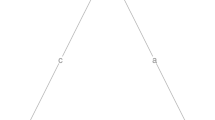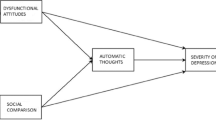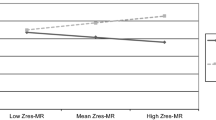Abstract
This research tested an integrated model derived form Beck's cognitive theory of depression. The integrated model postulated dysfunctional attitudes as a cognitive moderator and automatic thoughts as a cognitive mediator in the relationship between negative life events and depressive symptoms. In Study 1, 355 undergraduates completed the Life Experiences Survey, the Dysfunctional Attitude Scale, the Automatic Thoughts Questionnaire, and the Beck Depression Inventory. In general, the structural equation analyses confirmed not only the integrated model but also the symptom model, one of the competing models, where negative cognitions are a consequence of depression. Study 2 reexamined the two models with two-wave panel data of 200 undergraduates who completed the four scales twice, with 3 months between testing sessions. The structural equation analyses on these data also confirmed both of the two models. These results were discussed in relation to the possibility of a model with a vicious circle between negative cognitions and depression.
Similar content being viewed by others
References
Abramson, L. Y., Alloy, L. B., & Metalsky, G. I. (1988). The cognitive diathesis-stress theories of depression. Toward an adequate evaluation of the theories' validities. In L. B. Alloy (Ed.),Cognitive processes in depression (pp. 3–30). New York: Guilford Press.
Barnett, P. A., & Gotlib, I. H. (1988). Dysfunctional attitudes and psychological stress: The differential prediction of future psychological symptomatology.Motivation and Emotion, 12, 251–270.
Baron, R. M., & Kenny, D. A. (1986). The moderator-mediator variable distinction in social psychological research: Conceptual, strategic, and statistical considerations.Journal of Personality and Social Psychology, 51, 1173–1182.
Beck, A. T. (1967).Depression: Clinical, experimental and theoretical aspects. New York: Harper & Row.
Beck, A. T. (1976).Cognitive therapy and the emotional disorders. New York: International University Press.
Beck, A. T., & Beamesderfer, A. (1974). Assessment of depression: The depression inventory. In P. Pinchot (Ed.),Modern Problems in Pharmacopsychiatry (Vol. 7). Basel, Switzerland: Karger.
Beck, A. T., Rush, A. J., Shaw, B. F., & Emery, G. (1979).Cognitive therapy of depression. New York: Guilford Press.
Erbaugh, J. (1961). An inventory for measuring depression.Archives of General Psychiatry, 4, 561–571.
Bentler, P. M., & Bonnett, D. G. (1980). Significance tests and goodness of fit in the analysis of covariance structure.Psychological Bulletin, 88, 588–606.
Billings, A. G., Cronkite, R. C., & Moos, R. H. (1983). Social-environmental factors in unipolar depression: Comparison of depressed patients and nondepressed controls.Journal of Abnormal Psychology, 92, 119–133.
Breckler, S. J. (1990). Applications of covariance structure modeling in psychology: Cause for concern?Psychological Bulletin, 107, 260–273.
Brewin, C. R. (1985). Depression and causal relations: What is their relation?Psychological Bulletin, 98, 297–309.
Bumberry, W., Oliver, J. M., & McClure, J. N. (1978). Validation of the Beck Depression Inventory in a university population using psychiatric estimates as a criterion.Journal of Consulting and Clinical Psychology, 46, 150–155.
Cudeck, R., & Browne, M. W. (1983). Cross-validation of covariance structures.Multivariate Behavioral Research, 18, 147–167.
Dobson, K. S., & Breiter, H. J. (1983). Cognitive assessment of depression: Reliability and validity of three measures.Journal of Abnormal Psychology, 92, 107–109.
Dohrenwend, B. S., & Dohrenwend, B. P. (1974).Stressful life events: Their nature and effects. New York: Wiley.
Dohrenwend, B. P., & Shrout, P. E. (1985). “Hassles” in the conceptualization and measurement of life stress variables.American Psychologist, 40, 780–785.
Eaves, G., & Rush, A. J. (1984). Cognitive patterns in symptomatic and remitted unipolar major depression.Journal of Abnormal Psychology, 93, 31–40.
Frese, M. (1986). Coping as a moderator and mediator between stress at work and psychosomatic complaints. In M. Appley & R. Trumbull (Eds.),Dynamics of stress (pp. 183–206). New York: Plenum Press.
Hamilton, E. W., & Abramson, L. Y. (1983). Cognitive patterns in major depressive disorder: A longitudinal study in a hospital setting.Journal of Abnormal Psychology, 92, 173–184.
Hammen, C., Marks, T., Mayol, A., & deMayo, R. (1985). Depressive self-schemas, life stress, and vulnerability to depression.Journal of Abnormal Psychology, 94, 309–319.
Hollon, S. D., & Kendall, P. C. (1980). Cognitive self-statements in depression: Development of an automatic thoughts questionnaire.Cognitive Therapy and Research, 4, 383–395.
Jöresberg, K. G., & Sörbom, D. (1986).LISREL VI. Mooresville, IN: Scientific Software.
Kanner, A. D., Coyne, J. C., Schaeffer, C., & Lazarus, R. S. (1981). Comparison of two modes of stress measurement: Daily Hassles and uplifts versus major life events.Journal of Behavioral Medicine, 4, 1–39.
Kovacs, M., & Beck, A. T. (1978). Maladaptive cognitive structure in depression.American Journal of Psychiatry, 135, 525–533.
Kuiper, N. A., Olinger, L. J., Macdonald, M. R., & Shaw, B. F. (1985). Self-schema processing of depressed and nondepressed content: The effects of vulnerability to depression.Social Cognition, 3, 77–93.
Kuiper, N. A., Olinger, L. J., & Martin, R. A. (1988). Dysfunctional attitudes, stress, and negative emotions.Cognitive Therapy and Research, 12, 533–547.
Lewinsohn, P., Steinmetz, J., Larson, D., & Franklin, J. (1981). Depression-related cognitions: Antecedent or consequence?Journal of Abnormal Psychology, 90, 213–219.
Olinger, L. J., Kuiper, N. A., & Shaw, B. F. (1987). Dysfunctional attitudes and stressful life events: An interactional model of depression.Cognitive Therapy and Research, 11, 25–40.
Oliver, J. M., & Baumgart, E. P. (1985). The Dysfunctional Attitude Scale: Psychometric properties and relation to depression in an unselected adult population.Cognitive Therapy and Research, 9, 161–167.
Parry, G., & Brewin, C. R. (1988). Cognitive style and depression: Symptom-related, event-related or independent provoking factor:British Journal of Clinical Psychology, 27, 23–35.
Reda, M. A., Carpiniello, B., Secchiaroli, L., Blanco, S. (1985). Thinking, depression, and antidepressants: Modified and unmodified beliefs during treatment with amitriptyline.Cognitive Therapy and Research, 9, 135–143.
Robins, C. J., & Block, P. (1988). Personal vulnerability, life events, and depressive symptoms: A test of a specific interaction model.Journal of Personality and Social Psychology, 54, 847–852.
Sarason, I. G., Johnson, J. H., & Siegel, J. M. (1978). Assessing the impact of life changes: Development of the life experiences survey.Journal of Consulting and Clinical Psychology, 46, 932–946.
Silverman, J. S., Silverman, J. A., & Eardley, D. A. (1984). Do maladaptive attitudes cause depression?Archives of General Psychiatry, 41, 28–30.
Simons, A. D., Garfield, S. L., & Murphy, G. E. (1984). The process of change in cognitive therapy and pharmacotherapy: Change in mood and cognitive.Archives of General Psychiatry, 41, 45–51.
Smith, T. W., Boaz, T. L., & Denney, D. R. (1984). Endorsement of irrational beliefs as a moderator of the effects of stressful life events.Cognitive Therapy and Research, 8, 363–370.
Stiles, T. C., & Götestam, K. G. (1989). The role of automatic thoughts in the development of dysphoric mood: An Analogue experiment.Cognitive Therapy and Research, 12, 161–170.
Stones, A. A. (1985). Assessment of coping efficiency: A comment.Journal of Behavioral Medicine, 8, 155–117.
Teasdale, J. D. (1983). Negative thinking in depression: Cause, effect or reciprocal relationship?Advances in Behavior Research and Therapy, 5, 3–26.
Weissman, A. N., & Beck, A. T. (1978).Development and validation of the Dysfunctional Attitude Scale. Paper presented at the American Educational Research Association Annual Convention, Toronto, Canada.
Wise, E. H., & Barnes, D. R. (1986). The relationship among life events, dysfunctional attitudes, and depression.Cognitive Therapy and Research, 10, 257–266.
Zuroff, D. C., & Mongrain, M. (1987). Dependency and self-criticism: Vulnerability factors for depression affective states.Journal of Abnormal Psychology, 96, 14–22.
Author information
Authors and Affiliations
Additional information
We gratefully acknowledge the assistance of David Chant in the data analysis and two anonymous reviewers for helpful comments on a draft of this article.
Rights and permissions
About this article
Cite this article
Kwon, SM., Oei, T.P.S. Differential causal roles of Dysfunctional Attitudes and Automatic Thoughts in depression. Cogn Ther Res 16, 309–328 (1992). https://doi.org/10.1007/BF01183284
Issue Date:
DOI: https://doi.org/10.1007/BF01183284




